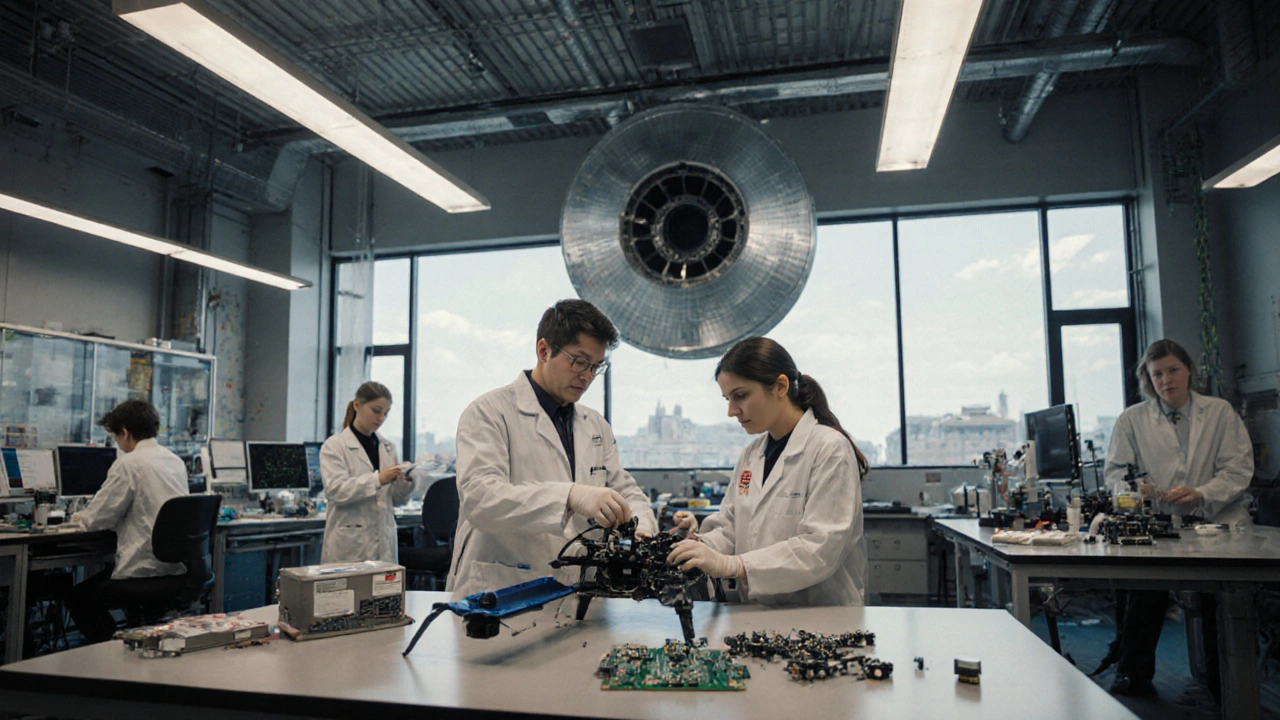Imperial College London isn’t just another university. It’s where you go if you want to build robots, design clean energy systems, or crack the code on disease outbreaks-all while walking past Nobel laureates in the cafeteria. If you’re thinking about studying science or engineering here, you’re not just picking a school. You’re choosing a launchpad.
What Makes Imperial’s Science and Engineering Programs Different?
Most universities teach science. Imperial builds it. The difference shows up in the labs, the projects, and the way professors talk to you like a future colleague, not a student. In the first year of Chemical Engineering, you don’t just learn thermodynamics-you design a reactor that could cut carbon emissions from a factory. In Biology, you don’t memorize cell structures-you use CRISPR tools in a real lab alongside PhD students.
Imperial’s engineering programs are ranked top 5 globally for employer reputation (QS World University Rankings 2025). Why? Because companies like Rolls-Royce, BP, and SpaceX come straight to campus to hire. They don’t want graduates who passed exams. They want people who’ve already solved real problems.
Top Programs You Can Actually Get Into
Let’s cut through the noise. You don’t need a perfect 4.0 GPA to get in-but you do need to show you’ve done something with your curiosity. Here are the three most popular science and engineering degrees, and what they really look like:
- Biomedical Engineering: You’ll spend half your time in the hospital. Students have built wearable sensors that predict sepsis in ICU patients. One team’s prototype is now being tested at St. Mary’s Hospital.
- Aeronautical Engineering: You don’t just study flight theory-you build drones. The college has its own wind tunnel, and every group designs a plane that flies in the final project. Last year, a student team’s electric VTOL drone won a national innovation prize.
- Computer Science with Artificial Intelligence: This isn’t coding 101. You train models on real medical imaging data, not fake datasets. The AI lab partners with the NHS, so your code could help diagnose tumors faster.
Admissions don’t just look at grades. They want to see a project, a hackathon, a science fair entry-even a YouTube video where you explained how a rocket engine works. One admitted student built a solar-powered water purifier for his village in Kenya. That’s the kind of thing that stands out.
Student Life: It’s Not Just Labs and Libraries
Yes, you’ll work hard. But Imperial students aren’t robots. The campus has a climbing wall, a 24-hour study lounge with espresso machines, and a student-run robotics club that hosts weekly build nights. The Science Society throws a “Lab Coat Party” every term-where everyone dresses up as their favorite scientist. Last year, someone showed up as Marie Curie with a glowing radium prop.
Most undergrads live on or near campus. The student housing in South Kensington costs around £1,100-£1,500 a month, depending on the room. It’s expensive, but you’re walking distance from the Natural History Museum, Hyde Park, and the tube. Many students get part-time jobs on campus-lab assistants, tech support, or tutoring. The pay is £12-£15/hour, and it’s flexible around lectures.
Food on campus? The canteens serve decent meals for £5-£8. The “Engineering Café” has the best coffee and the loudest debates about quantum computing. Off-campus, you can find cheap eats in nearby Brompton Road-Thai curry for £7, falafel wraps for £4.50.

Research Opportunities Start Day One
At most schools, undergrads wait until their third year to touch real research. At Imperial, you can apply for a summer project in your first term. The college funds over 1,200 student research placements every year.
Last summer, a first-year Physics student worked with a team developing quantum sensors for underground mapping. She published her findings in a student journal by October. Another student, studying Materials Science, helped create a new type of biodegradable plastic that’s now being tested by a startup in Bristol.
You don’t need to be “the best” to get in. You just need to ask the right question. Professors here don’t wait for you to knock on their door-they email you if they see your project proposal is interesting.
What Happens After Graduation?
Imperial has one of the highest graduate employment rates in the UK-94% of science and engineering grads are in work or further study within six months (HESA 2024 data).
Where do they go? A third join tech firms like Google or DeepMind. Another third go into energy, aerospace, or healthcare startups. The rest head to PhD programs-often at MIT, Stanford, or ETH Zurich. One recent grad founded a company that uses AI to detect early signs of Parkinson’s from voice recordings. It’s now in clinical trials.
Salaries? Entry-level engineers average £42,000. Data scientists and AI specialists start at £48,000+. That’s not just good-it’s top-tier for someone who just turned 22.

Is Imperial Right for You?
It’s not for everyone. If you want a relaxed campus with lots of parties and low-pressure classes, this isn’t it. The workload is intense. Group projects run late into the night. Deadlines are brutal. But if you’re the kind of person who gets excited about fixing something broken-even if no one else cares-you’ll thrive.
You’ll need grit. But you’ll also get access to tools most universities can’t afford: a fusion reactor simulation lab, a cleanroom for nanotech, a 3D bioprinter for tissue engineering. And you’ll be surrounded by people who think the same way you do.
Don’t apply because Imperial sounds impressive. Apply because you want to build the future-and you’re ready to get your hands dirty doing it.
Do I need to know how to code to study engineering at Imperial?
No, but you’ll learn fast. Most engineering programs include programming in the first term-Python and MATLAB are the main ones. If you’ve never coded before, that’s fine. The college offers free beginner workshops. What matters more is your ability to solve problems logically. If you’ve ever taken apart a gadget to see how it worked, you’re already ahead.
Can international students get internships in the UK after enrolling?
Yes. Imperial’s Career Service helps international students find placements. Most science and engineering roles are eligible under the Skilled Worker Visa. Many students land internships with companies like Siemens, GlaxoSmithKline, or Arup during their second year. These often lead to full-time offers after graduation. The college also runs an annual Global Internship Fair with over 150 companies.
Is it hard to switch from science to engineering or vice versa?
It’s easier than you think. Imperial allows transfers between related programs in the first year if you meet the grade requirements. A Biology student who discovers a passion for robotics can move into Biomedical Engineering. A Physics student who loves data can shift into Computer Science. You’ll need to catch up on a few modules, but the college provides bridging courses and academic advisors to help.
What’s the biggest mistake students make at Imperial?
Trying to do everything alone. Imperial’s culture rewards collaboration, not solo heroics. Students who wait until the last minute to ask for help often burn out. The best performers are the ones who form study groups early, join lab clubs, and talk to professors during office hours. There’s no shame in asking. Everyone’s in the same boat.
Are there scholarships for international students in science and engineering?
Yes. Imperial offers over 200 scholarships for international undergraduates each year. The most common are the President’s Scholarships (up to £20,000 per year) and the Faculty Excellence Awards. You apply automatically when you submit your UCAS application-no extra form needed. Selection is based on academic merit and personal statement. Last year, 12% of international engineering students received full or partial funding.
Next Steps: What to Do Now
If you’re serious about applying:
- Check the entry requirements for your chosen program on Imperial’s official website. Most require A-levels in Maths and Physics, or equivalent.
- Start a project-even a small one. Build a simple robot, code a weather app, analyze data from a public science dataset. Document it. That’s your edge.
- Reach out to current students via Imperial’s student ambassador program. They’ll tell you what the labs are really like.
- Visit if you can. Open days are in June and September. Walk through the engineering block. Sit in the cafeteria. Talk to someone who’s been there a year. You’ll know if it feels right.
Imperial College London doesn’t promise an easy ride. But if you’re ready to push your limits, it’s one of the few places on earth where your ideas can actually change the world-and people will help you do it.
